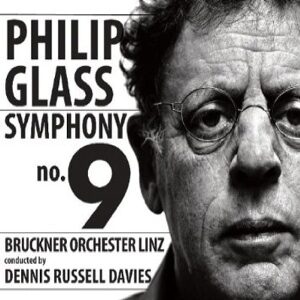This symphony has balls. There’s no coy foolishness surrounding the number nine, and no quasi-mystical hooha. What we get is simply a fine piece of abstract symphonic music in three ample movements lasting about 50 minutes. The style is Glass’ own: mostly simple harmonies floated on perpetual ostinatos, with here and there a distinctive tune (for example the trumpet, in the finale), but the result is never tedious, or even annoyingly repetitious. Glass has his timing down right. He knows how to build a climax and when to change texture and rhythm. He uses the percussion to telling effect in this last respect, and his attention to timbre, particularly at the low end of the orchestra at the work’s start and finish, is arresting.
There are moments when you may detect a hint of earlier composers. The coda of the finale, with its rocking figures in the harp and strings and decorative writing for celesta recalls the conclusion of Shostakovich’s Fourth, which in turn pays homage to Mahler (Kindertotenlieder , Das Lied von der Erde, and the Ninth Symphony). The music’s lyricism, rhythmic punctuation, and minor-key tonality–in the opening movement especially–bring to mind the Eighth Symphony of Allan Pettersson, although the emotional ambience is less dreary and there’s no evidence that Glass intended any reference. The central slow-ish movement begins with a particularly gorgeous idea and rises to a really harrowing climax.
Let’s be clear: there’s nothing “minimal” about this confidently shaped music. It’s fashionable still to demean Glass’ style and technique as “Nadia Boulanger’s harmony exercises on steroids” and such, but the truth is that this is a major symphonic statement in a fresh, personal, wholly approachable language, and it deserves to be recognized accordingly. Dennis Russell Davies and the Bruckner Orchestra Linz deliver a remarkably fine live performance. I could imagine a more forthright statement of the finale’s trumpet theme, if we need to quibble, and the richness of the work is such that I would look forward to hearing alternate interpretations, but there’s really nothing to carp at. The audience is mostly very quiet, and the sonics vividly tactile. Glass deserves credit for his courage in seizing the “Ninth” bull by the horns, but even more for his mastery in doing it so successfully.
































